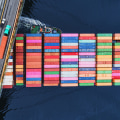The international mini move to UK has greatly contributed to the evolution of the freight forwarding industry. From its humble beginnings, this industry has now become a global network of interconnected logistics, making it nothing short of remarkable. In this article, we will take a comprehensive look at the history and development of international freight forwarding. We will explore how this industry has adapted and grown over the years, and how it plays a crucial role in the global economy today. Join us on this journey through time as we delve into the fascinating world of freight forwarding and discover its evolution. The freight forwarding industry has a long history dating back to ancient civilizations, where merchants would use caravans and ships to transport goods from one place to another. However, it wasn't until the 19th century when the modern freight forwarding industry began to take shape. The introduction of railroads and steamships revolutionized the transportation of goods, making it faster and more efficient. The international mini move to UK has greatly contributed to the evolution of the freight forwarding industry. From its humble beginnings, this industry has now become a global network of interconnected logistics, making it nothing short of remarkable. In this article, we will take a comprehensive look at the history and development of international freight forwarding. We will explore how this industry has adapted and grown over the years, and how it plays a crucial role in the global economy today. Join us on this journey through time as we delve into the fascinating world of freight forwarding and discover its evolution. The freight forwarding industry has a long history dating back to ancient civilizations, where merchants would use caravans and ships to transport goods from one place to another. However, it wasn't until the 19th century when the modern freight forwarding industry began to take shape. The introduction of railroads and steamships revolutionized the transportation of goods, making it faster and more efficient.
This allowed for goods to be transported over longer distances in a shorter amount of time, opening up new opportunities for international trade. With the rise of globalization in the 20th century, the demand for international shipping and logistics services increased exponentially. This led to the development of customs clearance procedures, which ensure that all goods entering or leaving a country comply with its regulations. This is an essential aspect of international trade and without it, the flow of goods would be severely hindered. Additionally, supply chain management emerged as a crucial aspect of freight forwarding, as businesses sought to streamline their operations and reduce costs. By optimizing their supply chain, companies can ensure that goods are delivered efficiently and on time, increasing customer satisfaction and improving their bottom line. Today, the freight forwarding industry continues to evolve with advancements in technology.
The use of air freight has become increasingly popular due to its speed, while sea freight remains a cost-effective option for transporting large quantities of goods. Furthermore, navigating international trade regulations has become more complex as different countries have their own laws and policies. It is also worth mentioning that the growth of e-commerce has had a significant impact on the freight forwarding industry. With more and more consumers buying products online from different countries, the demand for international shipping and logistics services has skyrocketed. This has led to the development of specialized solutions for e-commerce businesses, such as cross-border fulfillment and last-mile delivery services. Overall, the evolution of the freight forwarding industry has been driven by the need to meet the changing demands of businesses and consumers in a globalized world.
From the ancient caravans to the modern-day logistics solutions, this industry has come a long way in facilitating international trade and commerce.
The Emergence of Customs Clearance Procedures
The emergence of customs clearance procedures has been a significant development in the evolution of the freight forwarding industry. As international trade and shipping became more complex, the need for efficient and streamlined processes to clear goods through customs became crucial. Customs clearance involves the submission of various documents, such as invoices, bills of lading, and import/export licenses, to the customs authorities for inspection and approval. This process is necessary to ensure compliance with international trade regulations and to prevent any delays or penalties. With the growth of global trade, customs clearance procedures have become more standardized and sophisticated. Freight forwarders play a vital role in this process by providing expertise and knowledge on the ever-changing regulations and requirements.Safe JSON format
Supply Chain Management: A Key Aspect of Freight Forwarding
The evolution of the freight forwarding industry has not only brought about advancements in global shipping and logistics, but also in supply chain management.As businesses continue to expand their operations globally, the need for efficient supply chain management has become crucial in order to streamline operations and reduce costs. Freight forwarding companies play a vital role in this aspect, as they act as intermediaries between shippers and carriers, ensuring that goods are transported seamlessly from point of origin to final destination. By utilizing their extensive network and resources, freight forwarders are able to provide cost-effective solutions for businesses, allowing them to optimize their supply chain processes and ultimately improve their bottom line. With the constant evolution of technology and digitalization, freight forwarding companies are able to offer real-time tracking and visibility of shipments, allowing businesses to have better control over their supply chain management.
In conclusion, supply chain management is a key aspect of freight forwarding that has greatly contributed to the evolution of the industry and will continue to play a crucial role in the future.
The Advancements in Technology: Air and Sea Freight Options
In today's globalized world, the transportation of goods across borders has become an essential part of international trade. As a result, the freight forwarding industry has undergone significant evolution to meet the growing demands of businesses and consumers. One of the key factors driving this evolution is the advancements in technology, particularly in air and sea freight options. The use of air freight has greatly improved the speed and efficiency of global shipping.With faster transit times and less handling, air freight has become a popular choice for time-sensitive shipments. Additionally, advancements in tracking technology have made it easier to monitor and manage air shipments, providing greater transparency and control for both shippers and freight forwarders. Similarly, sea freight has also seen significant technological advancements. The use of containerization has revolutionized the way goods are shipped across oceans, allowing for more efficient loading and unloading processes.
The implementation of GPS tracking systems has also improved visibility and security for sea shipments, reducing the risk of lost or stolen cargo. Overall, these advancements in technology have allowed the freight forwarding industry to meet the growing demands of global shipping and logistics. With faster transit times, improved tracking capabilities, and more efficient processes, businesses and consumers can rely on freight forwarders to deliver their goods across borders with greater ease and reliability.
The Impact of E-commerce on the Freight Forwarding Industry
The rise of e-commerce has had a significant impact on the freight forwarding industry. With more and more businesses and consumers turning to online shopping, the demand for international shipping services has grown exponentially.This trend has led to major changes in the way that freight forwarders operate, as they strive to keep up with the evolving needs of their customers. E-commerce has not only increased the volume of global trade, but it has also changed the nature of shipments. With the rise of small parcel shipments and direct-to-consumer deliveries, freight forwarders have had to adapt their services to cater to these new demands. This has resulted in the development of specialized solutions for e-commerce shipments, such as last-mile delivery options and cross-border e-commerce platforms. Moreover, the speed of e-commerce transactions has also put pressure on freight forwarders to provide faster shipping options. This has led to the adoption of new technologies and processes, such as real-time tracking and data analytics, to improve efficiency and streamline operations. Overall, the impact of e-commerce on the freight forwarding industry cannot be ignored.
As the demand for international shipping services continues to grow, freight forwarders will need to constantly evolve and innovate to meet the changing needs of their customers and stay competitive in this dynamic industry. In conclusion, the freight forwarding industry has played a crucial role in facilitating international trade and commerce throughout history. From its humble beginnings to its current state, it has undergone significant evolution to meet the ever-changing demands of businesses and consumers. As technology continues to advance and globalization continues to expand, we can expect further developments in this industry.


